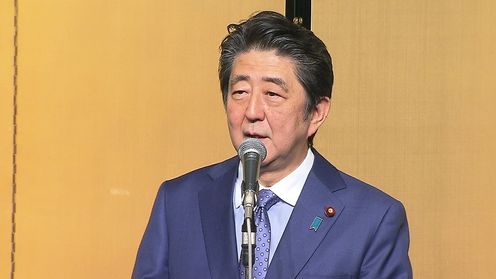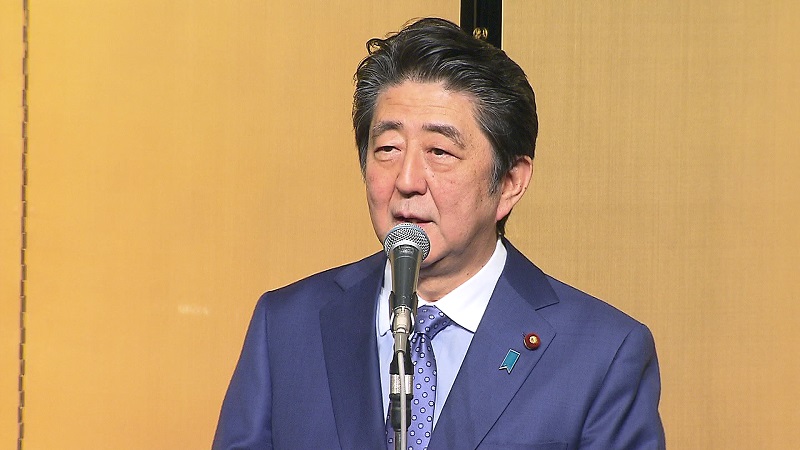Home > News > The Prime Minister in Action > December 2018 > Year-End Economists' Meeting
The Prime Minister in Action
Year-End Economists' Meeting
December 5, 2018
[Provisional translation]
On December 5, 2018, Prime Minister Shinzo Abe attended the year end party of economists, held in Tokyo.
The Prime Minister said in his address,
“When I attend this gathering, it reminds me of the end of the year or, it might be better to say that the ‘close’ of the year is coming. In any case, there is only a short while left in 2018.
I have returned to Japan just yesterday after visiting Buenos Aires, Uruguay, and Paraguay and I am still feeling the full effects of jet lag. Tomorrow, I am to attend the Committee on Judicial Affairs for two hours, and expected to give a response to those complicated questions, while still feeling strong jet-lag. With respect to Uruguay and Paraguay, my visit to these countries are the first of its kind as a Japanese Prime Minister. Whenever I visit South America, I always meet people of Japanese descent. In Uruguay—immigration to Uruguay commenced 80 years ago, and while there are only 450 people of Japanese descent in Uruguay today—80 people gathered to meet me. In Paraguay, I met many people of Japanese descent too. I was briefed by the Ministry of Foreign Affairs that I was the first time a Japanese Prime Minister stepped foot in the two countries. One or two weeks ago, however, a person of Japanese descent visited the embassy in Uruguay with a photo they took with my grandfather when he landed in Uruguay to transfer planes while travelling from Buenos Aires to Rio, or from Rio to Buenos Aires. This person was over 90 years old, but he was kind enough to visit and personally show me this photo. Anyway, according to the Ministry of Foreign Affairs, my visit was the first official visit to Uruguay, and I returned from that trip yesterday.
This year is ‘the year of the dog is a year of laughter,’ according to the market adage. Economists predict next year’s market trends and most of their prediction are mistaken. Starting with the PyeongChang Olympics, there was the U.S.-North Korea Summit Meeting, and the world economy is now facing the situation as we see. The year is truly a year of extreme upheaval. I believe predicting this year’s market trend must be a really difficult one. Next year is the year of the boar, and the market adage states ‘the year of the boar is a year of solidifying.’ After laughing, the market will solidify—solidify in a positive direction, and not freeze over. I understand it in the way that we solidify ourselves in order to expand further. Next year Japan will chair the G20, and we will also be hosting the Rugby World Cup, and countries from around Africa will come to Japan for the Tokyo International Conference on African Development (TICAD). Most significantly, next year His Majesty the Emperor will abdicate, and His Imperial Highness the Crown Prince will accede to the Imperial Throne, marking the end of the Heisei era and the start of a new era. In addition, we will see another big event, the consumption tax increase. While there are arguments as to whether we should raise the consumption tax, it is written in law and we follow this law accordingly—I see Chief Representative Yamaguchi (of Komeito) laughing and, I see the bitter smile of Minister of State for Economic and Fiscal Policy Motegi. We are now working on robust economic policies to deal with this change as the ruling coalition.
Next year, while the United States and China are to cease their competition of retaliatory measures at their borders, the so-called trade war, for 90 days for the time being, that cessation will end after the 90 days and we must be ready to make a robust response to its resumption. At the same time, I would like to create a strong economy that is not swayed by the state of the world economy. To that end, I received a briefing regarding a second supplementary budget just before. I would like to steadfastly compile a supplementary budget, which surely responds to immediate needs. That is also true of the supplementary budget to be finalized next year. I would like to compile one that surely repels the shock caused by the consumption tax increase. At the same time, I also would like to take firm measures in fiscal policy too. I see the Governor of the Bank of Japan is here; the Government will work with the Bank of Japan to achieve the price stability target, won’t we. We would like to steadily exert efforts to achieve that.
We are seeing that the foundation of our economy is being strengthened continuously. For example, since the Abe administration was inaugurated, the minimum wage has increased by 15 yen, then 16 yen, and we made them believe that next would be 17 yen—we have such a song, don’t we—15, 16, to 17. 15, 16, then 18. Afterwards, the minimum wage rose by 26 yen last year. This was the largest increase since we began collecting statistics on the hourly wage. Going forward, I would like to create the economic conditions that support the annual increase in the minimum wage no less than 3%. At the same time, the average of the winter bonus for this year is 950,000 yen. Companies kindly increased it significantly. It is important for people to ride the wave, and to ride the wave we have to keep pushing wages upwards. Since I missed the last year’s party, I would like to ask you for a major increase in next April for these two years. For six years, I always request the same thing and, if you steadily do it—as Mr. Kobayashi is nodding vigorously—if you steadily do it, it is certain that we will see the increase of consumption and a virtuous economic cycle. Afterwards, two years later, we will have the Tokyo Olympics. Following that, we won the bid for the World Expo in Osaka—it was quite a fierce competition. We are getting close to the same pattern when the Olympics were held in Tokyo in 1964, and the World Expo in Osaka in 1970. While I was only 10 years old at the time of the Tokyo Olympics, I thought Japan was amazing, with a great feeling of strength in my young, child’s body. I would like to make next year and the following years ones that can create this same feeling of strength and pride in young people throughout Japan.
To that end, if everyone is going to make a prediction, I would like to ask you to make a positive prediction. Next year, the TPP11 (the Comprehensive and Progressive Agreement for Trans-Pacific Partnership) or CPTPP will come into effect. With respect to the Japan-EU Economic Partnership Agreement (EPA), while deliberations are currently taking place in the Diet and the EU is also working on it too, I hope to materialize the early entry into it. I believe Japan is in a position to lead the global economy and free trade next year and I would like to make next year a wonderful one.
I am making a heartfelt prayer that next year will be a brilliant year for all of you. And this is not a small statement referring only to the Abe administration or the ruling coalition, I am extending my heartfelt wishes that it will be a wonderful year for all of Japan. That concludes my greeting, thank you very much.”


